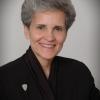The many observances of World War II anniversaries this year are insightful reminders about the devastation from worldwide inhumanity. These reminders sent me reviewing a remarkable event in my own life that occurred in 1975 — 40 years ago. On a sunny and pleasant July 31, 1975, I spent a day with Anne Frank’s father, Otto Frank, in his home with second wife, Fritzi, in Basel, Switzerland.
It all started the year prior when I was teaching eighth grade language arts at a Catholic school in Cincinnati, Ohio. Excerpts of The Diary of Anne Frank were in the reader, and the students eagerly devoured this. The excerpts included a picture of an emaciated group of prisoners trudging away from Auschwitz with the caption, “Mr. Frank survived and could have been in this group. He is living in Switzerland.” One of the students referred to that picture and asked me if Mr. Frank was still alive. The reader had been published in 1968, and the student’s question was asked six years later in 1974; what were the odds that someone surviving Auschwitz would still be alive 30 years after that experience? After all, Mr. Frank would have been 85 years old. I said that I didn’t know but would find out.
Without the benefit of the Internet for ready research on which we easily rely today, I went to the local librarian for help. We tried several sources with no luck, so finally she suggested that I write to the publisher of Anne’s diary, Doubleday. I did that. And then went on to other things with the students.
A couple months later I received an onion-skin airmail envelope from the country Schweiz (Switzerland). I had no idea what that could be so I opened it eagerly. It was a letter from Mr. Otto Frank himself. Indeed, Doubleday had forwarded my letter to Mr. Frank, and he chose to respond directly. This gave me the information to use with the students to write to Mr. Frank, telling him how much they appreciated reading Anne’s diary and asking him questions. Mr. Frank wrote back to the class as a group, answering their questions in one composite letter.
The students were satisfied; I was just getting started. Mr. Frank and I corresponded regularly until his death in 1980, and the visit to his home in 1975 was an incredible opportunity. His message is advice the world and our own country still needs: “Do not hate.”
[Sr. Nancy Linenkugel is a Sylvania Franciscan sister and chair of the department of Health Services Administration at Xavier University, Cincinnati Ohio.]
